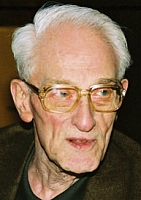In Memoriam - Prof. Willem Baarda (1917 - 2005)
Following Prof Tienstra, he continued and extended the word-wide acknowledged investigations of the Delft school in the field of error theory and adjustment procedures, based on statistical methods. He was the first to develop a systematic framework of statistical quality control for geodesy, and the famous “data snooping”, among others, since many years is part of testing procedures applied in geodesy and surveying. The introduction of criterion matrices for testing a network precision also goes back to him, as well as the invention of the reliability concept, now at widespread use. In this context, the invention of S-transformations also has to be mentioned, which is nowadays employed at “free-network” adjustments. At the end of the 1970’s, Prof. Baarda even extended his broad field of interest, looking from a very profound point of view closer on the links between geometric and physical geodesy. The coupling and interaction between these two sides of the same coin , which for many decades were considered rather separately, became the topic of some outstanding publications, even after his honourable retirement in 1982. In this connection, he attacked some fundamental problems raised by the introduction of geodetic space techniques, and a discussion study “Over coördinaten, lengte, tijd en potentiaal”, published only in 2000, contains numerous examples of his original thinking. It was only natural, that Prof. Baarda, in addition to the many functions hold at his university and at the Netherlands Geodetic Commission, strongly engaged himself in the two international organisations representing geodesy and surveying. By actively participating in FIG in the 1950’s, he made the surveyor known with the employment of statistical methods in surveying engineering, and he demonstrated his management abilities by serving as FIG Secretary General from 1955 to 1959 when he was appointed FIG Honorary Member. Since the 1960’s, Prof. Baarda concentrated on IAG, by collaboration in several Special Study Groups representing the forefront of the Association’s scientific work. He was member of the study groups on “Numerical Computations of Large Triangulation Networks”, “Computer Techniques in Geodesy”, and “Mathematical Structure of the Gravity Field”, and he chaired the Special Study Group on “Statistical Methods as applied to the Specification of Networks” over the long time span from 1963 to 1979. As a member of the IAG Subcommission on “Continental Networks” he contributed to the long standing IAG attempts to unify the geodetic systems in Europe. Again, his capabilities in science organisation were demanded, by collaboration in two Cassinis Committees, regularly established for reviewing the structures of IAG. In 1995, IAG awarded the Levallois Medal to Professor Baarda “in recognition of distinguished service to the Association and the science of geodesy in general”. Finally it should be mentioned that Prof. Baarda, as a highly engaged University Professor, exceptionally contributed to the organisation and improvement of geodetic and surveying engineering education, in his own university studies as well as a member of the IAG Commission on Education. Professor Baarda’s outstanding contributions to the fundamentals of our science and his successful endeavours to introduce new concepts into all fields of the practice of our profession have been appreciated by a number of national and international institutions. In addition to the honours given by FIG and IAG, we mention the appointment as Officer in the Order of Oranje Nassau by the Queen of the Netherlands (1956), the honorary membership of RICS, Great Britain (1968), the membership of the Dutch Royal Academy of Sciences (1971), the corresponding membership of the German Geodetic Commission at the Bavarian Academy of Sciences (1979), and the honorary doctor degree from the University of Stuttgart (1982). The geodetic community has lost one of its outstanding personage, which significantly formed the transition from classical to modern geodesy. Colleagues and scholars who had the chance to talk or to work with Professor Baarda, will remember his scientific curiosity, his deep-going trains of thought, but also his kind attitude and understanding of others. The community will keep him in mind through his scientific achievements and through the personal remembrance of many geodesists and surveyors. Prof. (em.) Dr.-Ing Wolfgang Torge 30 January 2005 |
||
